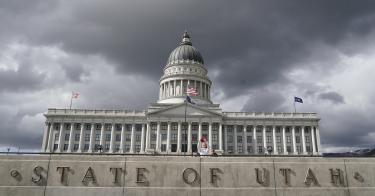A major credit rating company puts too much emphasis on so-called environmental, social, and governance factors in evaluating states, 11 of Utah’s top elected officials say in a letter to the company.
Calling these ESG factors “credit indicators” is an absurd attempt “to legitimize a dubious and unproven exercise in developing a political ratings system that is based on indeterminate factors,” Utah Gov. Spencer Cox, U.S. Sen. Mike Lee, U.S. Sen. Mitt Romney, state Treasurer Marlo Oaks, and other Republican state and federal officials say in the April 27 letter.
Objecting to the move to publish environmental, social, and governance scores for U.S. states, their letter to two top officials at S&P Global and its subsidiary, S&P Global Ratings, unambiguously points out:
Considering recent global events, the current economic situation in the U.S., and the unreliability and inherently political nature of ESG factors in investment decisions, we view this newfound focus on ESG as politicizing the ratings process. It is deeply counterproductive, misleading, potentially damaging to the entities being rated, and possibly illegal.
Indeed, environmental, social, and governance, investing, deceptively driven by the left, has become a political buzzword in insisting that policymakers and private sector leaders see themselves as stewards of a newly “woke” planet.
In actuality, ESG is a way to force companies and other entities to take positions in the political arena on issues that may have nearly nothing to do with their actual business activities or credit status.
It’s quite regrettable and curious to see S&P Global joining the ESG crowd, despite the fact that, as the letter notes, the well-respected financial firm has recognized that “having a social mission and strong ESG characteristics does not necessarily correlate with strong creditworthiness and vice versa.”
As highlighted by the joint letter from the Utah policymakers to Douglas L. Peterson, president and CEO of S&P Global, and Martina Cheung, president of S&P Global Ratings, it’s also perplexing to see that although
S&P recently removed all Russian company scores from their website, it is inconceivable how these [Russian] energy giants, controlled by a corrupt and reckless regime—and having been sanctioned for that regime’s misadventures before—managed to cobble together ESG scores up until a few weeks ago that exceeded those of law-abiding American companies critical to U.S. energy security.
All 12 of the letter’s signatories are Republicans, and only the state treasurer isn’t elected. Also signing were Utah’s lieutenant governor and attorney general; the president of the state Senate and speaker of the state House; and all four members of Utah’s U.S. House delegation.
Fundamentally, economic freedom—not the environmental, social, and governance agenda—makes the world cleaner, safer, and better governed.
As documented by The Heritage Foundation’s annual Index of Economic Freedom, it isn’t hard to find the economic damage inflicted by heavy-handed and misguided government policies, which result in lingering uncertainty, deteriorating entrepreneurial environments, and lower employment growth.
The true path to ensuring environmental, social, and governance improvements lies in focusing on policies that enhance economic freedom. As illustrated in Heritage’s index, the linkage between economic freedom, individual liberty, and prosperity is unambiguous.
Economic freedom isn’t just an end in itself, but also a proven means to real, measurable progress. As the index catalogues, preserving and advancing economic freedom enables individuals, entrepreneurs, and companies to better care for the poor and their environments; create better health care and education systems; ensure an abundance of food and clean water; and solve many other societal problems to make life better for a greater number of people.
By building on what works, we truly can accelerate progress in the face of even the most difficult challenges and chart ever greater success. The key to that is to advance the four pillars of economic freedom—the rule of law, limited government, efficient regulation, and market openness.
On that note, it is truly notable that Utah has pursued and preserved a high level of economic freedom by committing to free market principles.
According to the latest edition of Rich States, Poor States: ALEC-Laffer State Economic Competitiveness Index, Utah has been home to America’s best state economy for 15 years in a row.
As succinctly summed up in a recent commentary by Utah Senate President J. Stuart Adams and Jonathan Williams, chief economist and executive vice president of policy at the American Legislative Exchange Council:
After 15 years of being the highest-ranked state, Utah has never once taken its success for granted. Policymakers and business leaders continued to reach for new heights and resolved to never become complacent. Smart economic outcomes drive decisions. State leaders use a combination of tried-and-true methods, along with innovative ideas to turn the dial on Utah’s economy. Recently put to the test, Utah’s economy withstood and even thrived during the COVID-19 pandemic as other states and nations experienced drastic downturns.
Economic freedom is what really matters to creditworthiness and economic dynamism.
S&P Global, and many others fixated on an ESG agenda, should remember that.
This piece originally appeared in The Daily Signal




